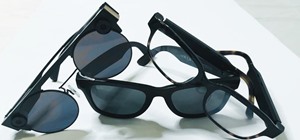The recent announcement that Facebook will begin inserting advertisements into its VR experience on its Oculus Quest headset has set the VR and augmented reality industry into a frenzy.
At first glance, the first thing many will point to is the recent history of Facebook and its somewhat rocky path regarding political and social issue ads. And while the company is still working on much-needed fixes, immediately writing off advertisements in VR (and later, augmented reality) as problematic may be an overreaction. Let's unpack why.
• Don't Miss: Facebook Develops AI That Can Copy Typefaces & Edit Text in AR
First, before we talk about the AR implications, let's deal with the current VR reality. Facebook/Oculus currently has the cheapest ($299), standalone, high-quality VR headset on the market, and it's already far more popular than the original Oculus Rift, which required a high-powered gaming PC (usually in the $1,200 range) and a tether, which limited movement. This isn't trivial. Most of Facebook's current competitors still require buying a pricier headset, which then must be tethered to a similarly pricey Windows PC.
For the last few years, starting with the Rift, and now the Oculus Quest and Quest 2, Facebook has effectively subsidized the growth of its VR product as a bet on the future of the technology. I think some end users have begun to take this subsidization for granted. But big bets like this aren't cheap. Investing in a brand new technology that primarily competes on the same footing as traditional gaming consoles—which remain insanely popular—is incredibly risky and, dare I say, ambitious. While entire careers are being built by gaming rock stars who lead sponsored teams, which are in turn receiving investments similar to NASCAR drivers and even some startups, VR developers are mostly (with a few notable exceptions) toiling away on amazing experiences that serve a comparatively small audience (for now).
This kind of incongruent large investment versus relatively small market size doesn't happen in a vacuum, it takes the courage to believe in a future that hasn't quite arrived yet. For all of the critique laid at the feet of Facebook in recent years, what is often missing is any praise for the risk it has taken with VR. Of course, some VR insiders will dismiss this and claim that Facebook is simply establishing an early (and unfair) beachhead in space that will ultimately be huge. But that assumes that VR will definitely be huge in the future.
As an early VR adopter—I used the first Oculus Dev Kit back in 2013, and quickly snapped up the Oculus Rift CV1 in 2016—so I actually share the optimism that VR will be huge in the coming years. However, I'm also realistic enough to understand that, as an early VR adopter, I'm more positively predisposed to think in best-case scenario terms when it comes to VR. Still, a small enthusiastic user base doesn't always turn into a massive market opportunity. Examples of this litter the hills of Silicon Valley of decades past. So for the VR insiders out there, let's take a moment to be honest with ourselves and admit that, The Matrix movie visions aside, betting on VR back in 2014 (when Facebook acquired Oculus for $2 billion) was not a sure bet. In fact, even in 2021, when Oculus Quest 2 is now the most used VR headset on Steam, VR (roughly $1 billion in revenue) is still a relatively risky bet in the face of the continued popularity of traditional console an PC gaming (roughly $100 billion).
• Don't Miss: Hands-On—Facebook Pioneers Augmented Reality for the TV with Latest Portal Hardware
Predictably, when Facebook acquired BigBox VR (the maker of VR gaming hit Population One) for an undisclosed amount, the chatter about Facebook potentially killing the VR market with such acquisitions immediately cropped up on social media. Instead of looking at the move as support for a popular VR gaming title, the response from some was to look at the possibly dark implications of the deal. But if you're a VR gaming nerd, in practical terms, this deal ensures that BigBox VR and its competitors have been deemed "viable" by Facebook and various still-to-come game studios working on VR experiences.
If you really want to see VR succeed, you need to hope for more not less investment from major companies with the deep pockets to make a bet on a still largely profit-challenged space. If your first response to Facebook's announcement about inserting ads in its VR headset was dystopian visions similar to Keiichi Matsuda's "Hyper-Reality" concept video (see below), you are 1. probably being too pessimistic, and 2. Maybe watching too much science fiction.
Can VR and AR advertisements get out of hand? Sure. But if Facebook's distribution of advertising (note: I mean "distribution," not choice of, or censoring of based on content) was so onerous, the Facebook.com website would be ghost town. It isn't. Like the very site you're reading now, countless TV stations, your favorite podcasts, and even premium streaming services, people will accept advertising mixed in with their content as long as you don't make it a terrible experience. Some companies get this right, some do not.
If you're skeptical about Facebook's ability to get this right in VR, ok, some healthy skepticism is fair. Be skeptical. Watch Facebook closely. Hold them to account. But when one of the biggest tech companies in Silicon Valley is betting on VR in a way that no other major company is (even PlayStation's CEO seem to lack confidence in the space), it's worth considering not coloring every single move by Facebook in VR as negative until you actually see bad acts on their part.
What does this all have to do with augmented reality? Everything. If VR has the potential to bring 1 billion people into its virtual realms, as Facebook CEO Mark Zuckerberg outlined back in 2017, then AR, which is inherently mobile, has the potential to capture the roughly 6 billion smartphone users around the planet today.
While the VR advertisements that help subsidize the Oculus Quest and its inevitable standalone VR headset competitors, AR advertisements will support a vast array of AR smartglass hardware and software in the coming years. The location-based AR advertisements almost certainly coming to the Google Maps AR experience will add rocket fuel to the search giant's bottom line. If Facebook's AR advertisements look anything like "Hyper-Reality," the platform will fail. That's easy to predict. The issue many seem to have is, well, Facebook being the one in control of the leading VR platform. So let's conduct a thought experiment: When Apple releases its long-rumored smartglasses, will you shun them if they later add advertisements to the platform? If so, where was your outrage when Apple boosted its App Store advertising platform in May? Crickets…
Look, I understand the concern some have for Facebook and how it may handle VR and AR in the coming years, but as a longtime Oculus user, I have yet to see anything to complain about. (Well, I was unhappy about the "Oculus by Facebook" branding switch instead of just "Oculus," but that's a minor issue in terms of user experience.) Should we be vigilant and watch Facebook closely, while keeping our VR and AR options open? Absolutely.
But let's not attempt to pre-vilify one of the biggest supporters of the metaverse before we even have concrete issues to lay on the table. If there are problems, I'll revise my position, but for now, particularly if it establishes a viable model for competing AR developers and hardware makers to profit, I'm willing to ride on this journey for a little while longer to see a future that once was only a science fiction dream.
Just updated your iPhone? You'll find new features for Podcasts, News, Books, and TV, as well as important security improvements and fresh wallpapers. Find out what's new and changed on your iPhone with the iOS 17.5 update.























Be the First to Comment
Share Your Thoughts